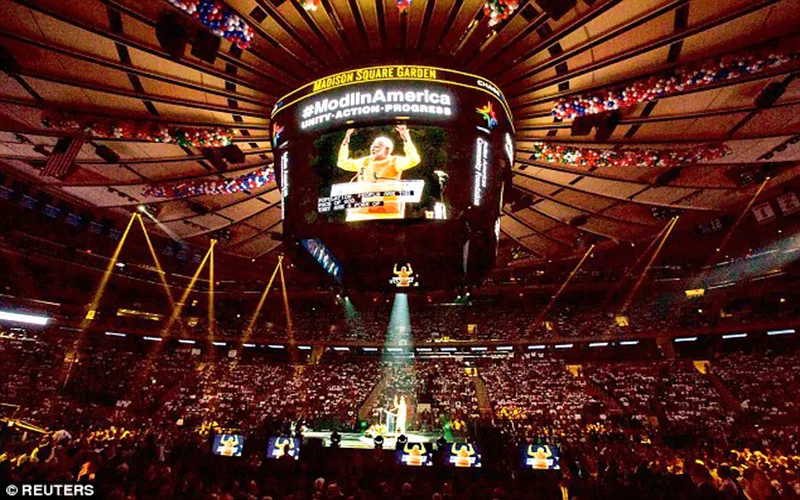-
CENTRES
Progammes & Centres
Location
Six months in office, Narendra Modi has set a scorching pace, but mainly in the area of foreign policy. He has undertaken eight foreign trips, of which six were to the Asia-Pacific region. And, there can be little doubt that the subtext of his visits to nine countries has been China.

It has been six months since Narendra Modi became Prime Minister of India. In this period, he has set a scorching pace, but mainly in the area of foreign policy. He has undertaken eight foreign trips, of which six were to the Asia-Pacific region. There were bilateral visits, as well as some which took place on the sidelines of multilateral summits. In the process, we have a clearer outline of a Modi foreign policy which appears to have two key elements-first, to attract investment and technology to trigger rapid economic growth in the country; and second, to shore up India's strategic position in its neighbourhood and larger Asian region.
It has featured several of "out of the box" elements, such as the invite to all Saarc head of states to attend his inauguration, or to have the president of the United States come as the chief guest at the 2015 Republic Day parade.
One set of Modi's visits can be seen as roadshows, aimed at showcasing himself and his government and offering up the promise of a new India which was open for business, both economic and strategic.
This was aimed at two targets-first, countries like the Japan, U.S. and Australia, from whom India expected investment, trade and with whom New Delhi sought strategic ties; and second, mainly with neighbours like Bhutan, Myanmar and Nepal, was where the aim was to bind the neighbourhood in closer economic and strategic ties to India.
There can be little doubt that the subtext of his visits to nine countries has been China. Whether it is in shoring up the neighbourhood, or Japan, U.S., Australia or even Fiji, New Delhi has Beijing in its mind.
But Modi has, at the same time, signalled a desire to do business with China.
He has gone along with Beijing on economic issues and taken India into the membership of the New Development Bank (Brics) and the Asian Infrastructure Investment Bank (AIIB), both Chinese initiatives aimed at loosening the power of western countries and Japan over international financial institutions.
But he has been equally firm in his dealings with the country, as was evidenced by his handling of the Chumar incident during the visit of Xi Jinping.
In speeches and joint statements in Japan, U.S. and Australia, security in relation to China was a key element.
It does not take a genius to understand the context of India-Japan's shared commitment to "maritime security, freedom of navigation and overflight, civil aviation safety, unimpeded lawful commerce, and peaceful settlement of disputes in accordance with international law".
With Australia, too, Modi called for greater cooperation on maintaining maritime security.
Considering both these countries are close allies of the U.S., it also means, though not quite spelt out, enhanced Indo-U.S. naval cooperation.
Modi appears to be a realist of the old school believing that what is supreme is national interest.
While India shares its world view with the West in terms of its institutions, laws- domestic and international- and so on, it is also aware that countries like Japan and the U.S. have a far denser relationship, and hence understands the need for good relations with China.
So, even while India has made it clear that it stands with the West on freedom of navigation and peaceful settlement of disputes, it is also aware that it needs to have friendly, if not excellent, relations with China, the Asian economic giant which is on its way to becoming a world power.
This was most clearly manifested in the dual nature of the Xi Jinping visit to India, which featured Chinese commitments on infrastructure investments, as well as Modi's appointment of Ajit Doval as the Special Representative of India for talks on the border issue and strategic relations with China only after the stage had been set through his visits to the U.S., Japan and Australia.
Modi has been radical, but not rash and has displayed the surefootedness of a veteran.
An example of this was evident in his dealings with Pakistan. Despite a great deal of speculation, he steadfastly refused to deal with Nawaz Sharif in Kathmandu. The reason became apparent when it transpired that the first meeting and the customary hand-shake would have taken place on November 26, the sixth anniversary of the Mumbai attack, and played badly at home. But the following day, at the retreat at Dhulikhel, he went and shared a warm handshake with Sharif.
(The writer is a Contributing Editor, Mail Today, and Distinguished Fellow, Observer Research Foundation, Delhi)
Courtesy: Main Today
The views expressed above belong to the author(s). ORF research and analyses now available on Telegram! Click here to access our curated content — blogs, longforms and interviews.

Manoj Joshi is a Distinguished Fellow at the ORF. He has been a journalist specialising on national and international politics and is a commentator and ...
Read More +